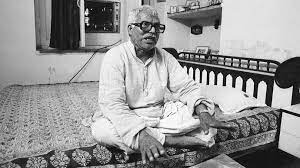Socialist leader Karpoori Thakur to be awarded Bharat Ratna posthumously
 NEW DELHI : Former Chief Minister of Bihar Karpoori Thakur was awarded the nation’s highest honor, Bharat Ratna, posthumously by the President of India Droupadi Murmu this evening. The announcement of the Bharat Ratna award for him comes ahead of his 100th birth anniversary on 24 January.
NEW DELHI : Former Chief Minister of Bihar Karpoori Thakur was awarded the nation’s highest honor, Bharat Ratna, posthumously by the President of India Droupadi Murmu this evening. The announcement of the Bharat Ratna award for him comes ahead of his 100th birth anniversary on 24 January.
The award comes 35 years after his death. Karpoori Thakur died on February 17, 1988. Coming ahead of the general election, it is seen a move to please the Chief Minister of a state that has 40 parliamentary seats. Karpoori Thakur was the pioneer in providing the Other Backward Classes (OBCs) with the benefit of reservation as he implemented the recommendations of the Mungeri Lal Commission during his tenure as Bihar CM from 1977 to 1979.
“I am delighted that the Government of India has decided to confer the Bharat Ratna on the beacon of social justice, the great Jan Nayak Karpoori Thakur Ji and that too at a time when we are marking his birth centenary. This prestigious recognition is a testament to his enduring efforts as a champion for the marginalized and a stalwart of equality and empowerment,” Prime Minister Narendra Modi posted on X.
Born in the Samastipur district of Bihar, Karpoori Thakur became part of India’s freedom struggle from a young age. During the Quit India Movement, he was jailed with other freedom fighters but kept struggling to push the Britishers out of the country. Following his initial triumph in 1952, he consistently emerged victorious in every subsequent election due to his widespread appeal arising from his modest lifestyle and unwavering commitment to promoting social justice.
Karpoori Thakur actively advocated for the rights of marginalized communities, including scheduled castes, scheduled tribes, and other backward classes. His commitment to social justice and inclusive development was a key aspect of his political ideology. Dubbed Jan Nayak by many in the state, Karpoori Thakur served as the Chief Minister of Bihar for a short while — from December 1970 to June 1971 and from December 1977 to April 1979. The Centre’s recognition for the state’s first non-Congress Chief Minister meets a long-standing demand of Bihar Chief Minister Nitish Kumar and his Janata Dal United.
It is pertinent to recall the circumstances in which Thakur had to quit as the chief minister in 1979. Karpoori Thakur headed the Janata Party government. Back then, the Janata Party was an amalgamation of two political groups – the erstwhile Bharatiya Jan Sangh rooted to the Rashtriya Swayamsevak Sangh (RSS) and the Lok Dal rooted to the socialist school of Ram Manohar Lohia and Jayaprakash Narayan, under the broader umbrella of Mahatma Gandhi and Bhimrao Ambedkar’s philosophies.
Karpoori Thakur who was the leader of the Lok Dal group implemented 33% reservation for the backward classes in government jobs in Bihar. In a way, what Karpoori did in Bihar way back in 1978 is what the V.P. Singh-led government did by implementing the Mandal Commission report at an all-India level in 1990.
“His unwavering commitment to uplift the downtrodden and his visionary leadership have left an indelible mark on India’s socio-political fabric. This award not only honors his remarkable contributions but also inspires us to continue his mission of creating a more just and equitable society,” PM Modi added on X.
“Karpoori Thakur as the chief minister worked for the welfare of all sections of the society but he was removed from his post within two years. We too are working in the interest of all sections of society. Sometimes, some people get annoyed at the prospect of working in the interest of all sections of the society,” the Bihar chief minister was quoted as saying while commemorating the anniversary of his mentor and the socialist patriarch at his party office on Sunday.
Karpoori’s decision fueled unrest among the ‘upper’ castes. The Bharatiya Jan Sangh group of the Janata Party revolted against Thakur’s decision and its leader, Kailashpati Mishra, was then finance minister under the Thakur-led government. Mishra orchestrated the departure of his group from the Karpoori government in April 1979.
(Bureau Report with Media Inputs).

